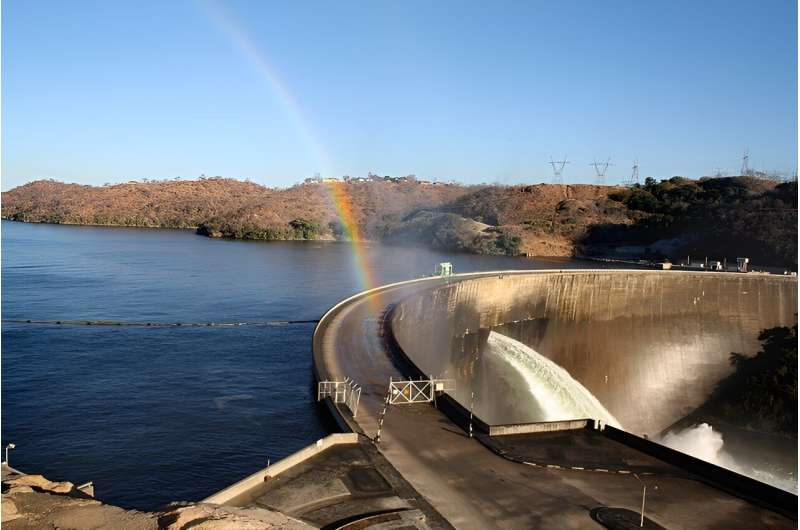This article has been reviewed according to Science X's editorial process and policies. Editors have highlighted the following attributes while ensuring the content's credibility:
fact-checked
peer-reviewed publication
trusted source
proofread
Declining cost of renewables and climate change curb the need for African hydropower expansion

Hydropower, traditionally one of Africa's most important sources of electricity, will rapidly fade in importance and cede its position to solar power. The attractiveness of new hydropower is decreasing fast, both due to the increasing economic competitiveness of solar panels and to the increasingly uncertain effects of climate change on river flows. The majority of new dams proposed across Africa should, therefore, probably never be built, suggests a new study published in Science.
Abundant rainfall, massive gorges, enormous waterfalls: the geography of Africa has all the elements for producing electricity from river flow. For decades, many African countries have relied on hydropower for electricity generation, including projects that inspire as much awe as controversy. One only needs to think of Ghana's Lake Volta, the largest artificial lake in the world; the Grand Ethiopian Renaissance Dam, Ethiopia's flagship project to provide millions of its citizens with electricity access; or DR Congo's dream of building the Grand Inga plant, which some claim could "light up all of Africa." And the voices that advocate for more of the same are strong: it is estimated that Africa has barely exploited 10% of its hydropower potential.
But is it a smart idea to plan for hundreds of new hydro dams across Africa? A new study from scientists in Italy, Austria, Ethiopia, and Belgium shows that this may not be the case. The study used a detailed energy model to investigate which combination of power sources would be most cost-effective for African countries to meet their rising demand until 2050—comparing hydropower to solar, wind, coal, natural gas, nuclear, and others. With unprecedented detail, the study individually considered every possible future hydropower plant in Africa—with its own storage size, river flow profile, and interplay with other hydropower dams.
"What is unique about our study is that we model every single hydropower plant in Africa individually—both existing ones and future candidates," explains Dr. Angelo Carlino, lead author of the study. "This way, our model can pinpoint which plants could be a smart investment and which ones should probably not be built."
Adding up all the numbers provides a sobering picture of the future of hydropower in Africa. The study found that up to 67% of possible future hydropower plants in Africa may not be worth the investment. This is mainly because hydropower will soon largely become unable to compete economically with solar and (to a lesser extent) wind power, whose costs have dropped at unprecedented rates in the last decade.
In addition, the effects of prolonged droughts on hydropower, likely to worsen due to climate change, would have to be mitigated through additional investments. "This is another reason why solar power will emerge as the more attractive technology in the long term," says Dr. Matthias Wildemeersch, a research scholar at the International Institute for Applied Systems Analysis (IIASA) in Austria and co-author of the study.
Does this mean that it is "game over" for hydropower? Not entirely, as the study explains: in the short-term, some new hydropower plants could still provide cheap power for countries in need, and they could also be used flexibly to help the integration of solar and wind, whose output constantly fluctuates.
"Our model shows which specific hydropower plants would still be cost-effective in the short-term," comments Professor Andrea Castelletti, professor in Natural Resources Management at Politecnico di Milano and senior author of the study. "Especially in the Congo, Niger, and Nile basins, there are certain projects that would be worth the effort, as long as they are well-planned and harmful environmental effects are kept to a minimum."
But in the long-term, solar power would emerge as crystal-clear technology to be favored by most African countries, echoing the International Energy Agency's 2020 claim that solar power would soon become the new "king" of electricity markets worldwide.
"The window for hydropower in Africa to be a feasible investment is very rapidly closing," adds Professor Sebastian Sterl, professor in Energy Meteorology at the Vrije Universiteit Brussel (VUB), Belgium, and senior scientist at the World Resources Institute (WRI) in Addis Ababa, Ethiopia. The study suggests that beyond 2030, only a very limited number of hydropower plants would remain attractive investments across Africa. "Aside from cost-effectiveness, this is generally good news for the environment: it means that many rivers won't have to be dammed and can keep their natural course," concludes Sterl.
More information: Angelo Carlino et al, Declining cost of renewables and climate change curb the need for African hydropower expansion, Science (2023). DOI: 10.1126/science.adf5848
Journal information: Science
Provided by Polytechnic University of Milan





















